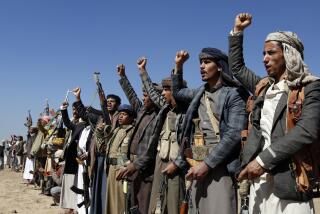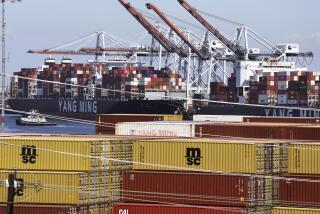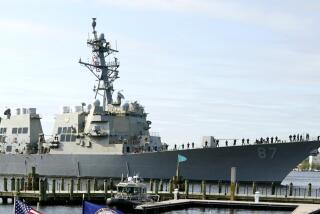Mukalla is an oasis of stability in war-torn Yemen. So why do some residents miss Al Qaeda?
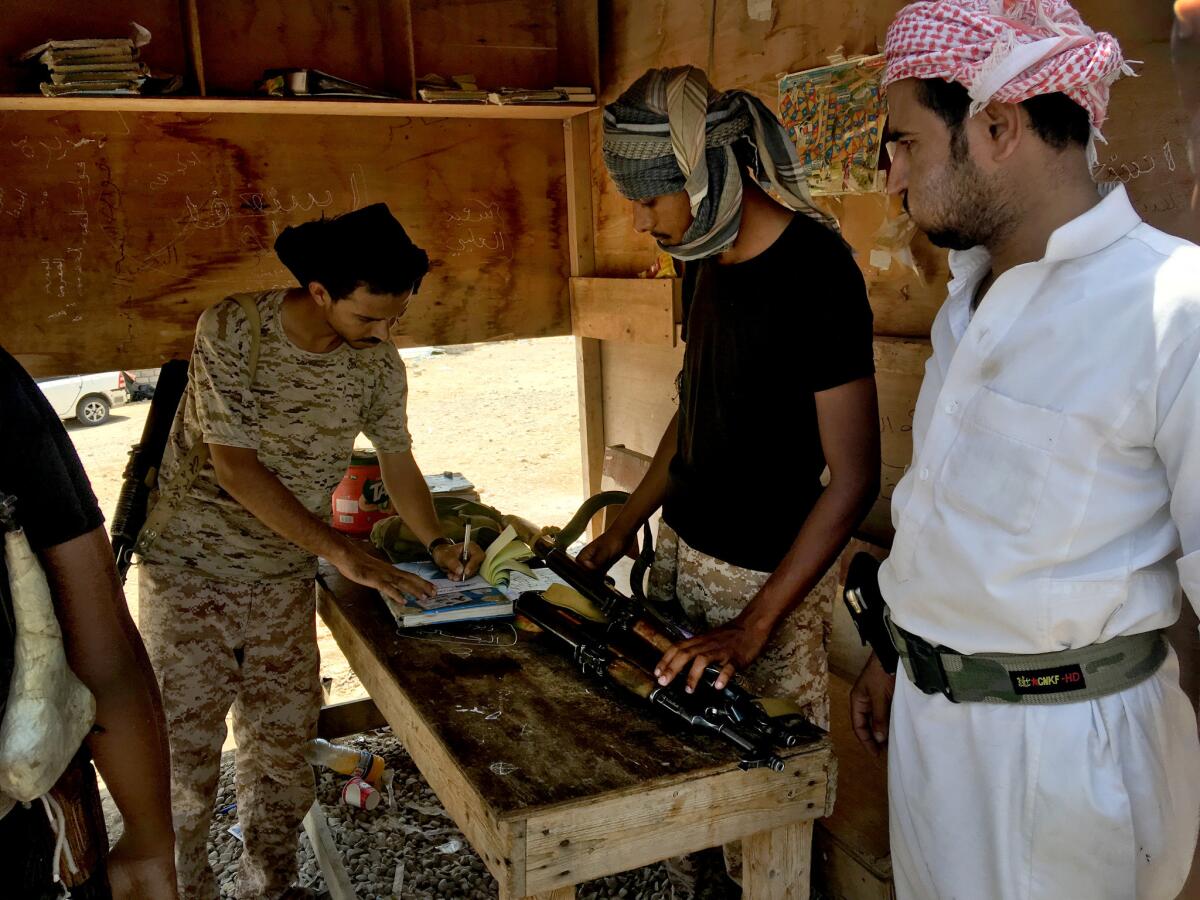
Fuel truck driver Ali Astal wouldn’t dare cross this country brimming with guns and militias without a Kalashnikov or two stashed under the dashboard.
But when he reaches the Mukalla city limits, he gamely surrenders his weapons at a checkpoint.
“This is for the city’s security,” he said as a soldier wrote out a receipt so he might collect the guns on his way out.
Mukalla, former Al Qaeda bastion of about 500,000 people, is one of the safest cities in a nation torn apart by a brutal civil war that has claimed at least 10,000 lives, displaced 2 million and forced the internationally recognized government into exile. It may be the only place in Yemen that doesn’t allow civilians to carry firearms in public, a common sight elsewhere.
But two years after troops from the United Arab Emirates and their local allies reclaimed the city, a port on the Arabian Sea, residents are growing restless. Though the relative security is a welcome relief from bombings and shootings that were once commonplace, lasting stability will depend on reconstruction and economic development, and there has been little progress on those fronts.
Mukalla, like many places nominally under the authority of President Abdu Rabu Mansour Hadi’s government in exile, has largely been left to fend for itself.
Buildings destroyed by airstrikes still scar some neighborhoods. Power outages last up to eight hours a day. Raw sewage seeps from damaged pipelines. Jobs are hard to come by and usually don’t pay well.
Especially galling to many residents is that Mukalla, capital of the oil-rich province of Hadramawt, is beset by chronic fuel shortages. Long lines form at gas stations when deliveries arrive.
“I remember once I parked my car in the line at 11 a.m. and waited until nighttime, then slept in my car holding my breath till morning and finally got some,” said Lutfi Balateef, 23, as he waited to fill his tank one blistering afternoon.
Families fleeing fighting elsewhere in Yemen have poured into the city, adding to the pressure on hospitals, schools and other services. Mukalla is also contending with the loss of remittances from Yemenis who were living in Saudi Arabia for work but were pushed out by policies there intended to create jobs for Saudis.
And last month, the precipitous decline of Yemen’s currency sent hundreds of people into the streets to protest soaring prices.
In one startling sign of discontent, some of Mukalla’s cosmopolitan residents expressed nostalgia for the terrorist franchise known as Al Qaeda in the Arabian Peninsula, widely regarded as the network’s most dangerous affiliate.
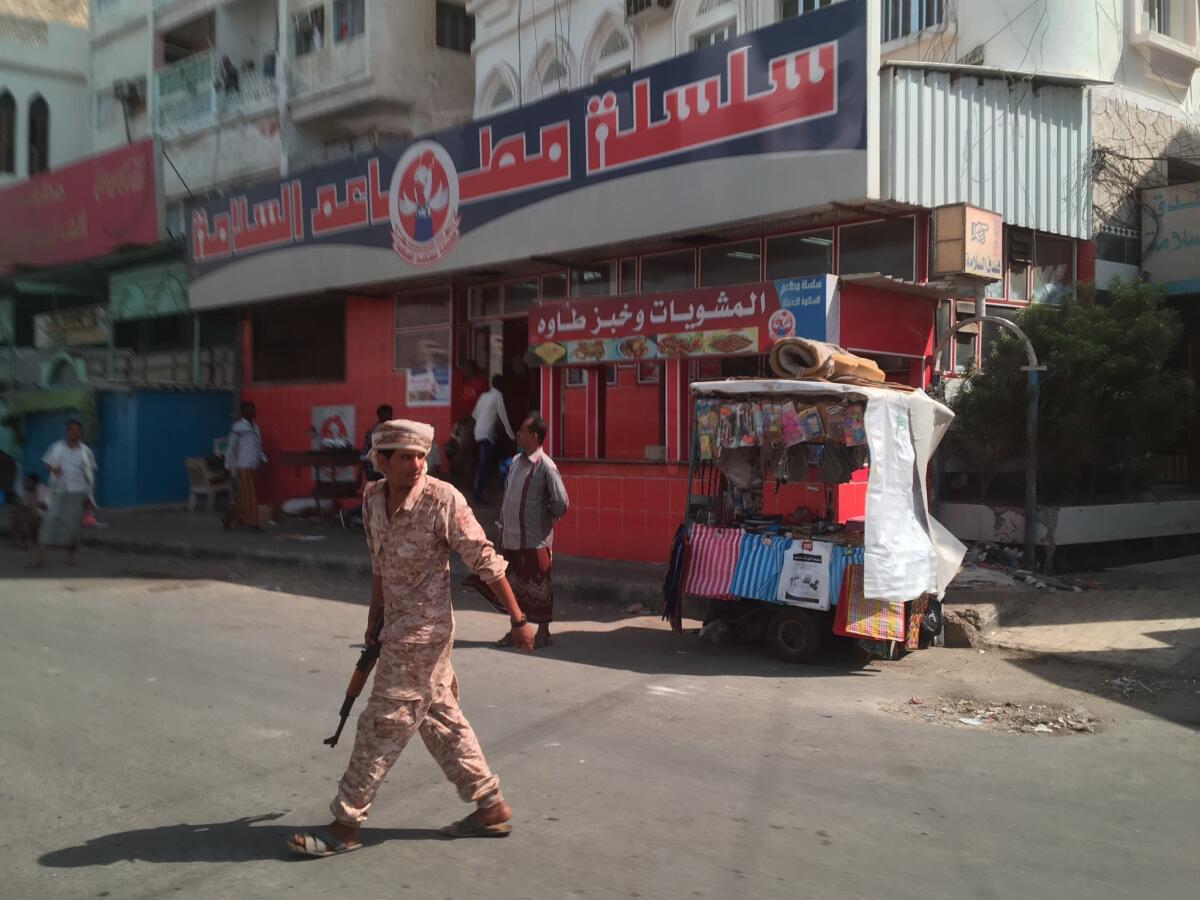
The group swept into the city virtually unopposed in the spring of 2015 as a military coalition led by Saudi Arabia and backed by the United States was focused on its main target: northern rebels known as Houthis, who months earlier took over the capital, Sana, sending the president fleeing south to the port city of Aden and then to Saudi Arabia.
Mukalla became the centerpiece of an Al Qaeda fiefdom that extended nearly 400 miles along the Yemeni coastline. The militants took over military bases and armories and — according to an investigation by Reuters news agency — looted as much as $100 million from a central bank branch, extorted $1.4 million from the national oil company and collected up to $2 million a day in taxes on goods coming into the port.
They ruled with brutal efficiency, inflicting harsh punishments on those who crossed them. Two men denounced for providing information that led to the death of Al Qaeda’s No. 2 leader, Nasir Abdel-Karim Wahishi, in a U.S. drone strike were shot and their bodies suspended for three days from an overpass, crucifixion-style. A woman accused of adultery was reportedly stoned to death.
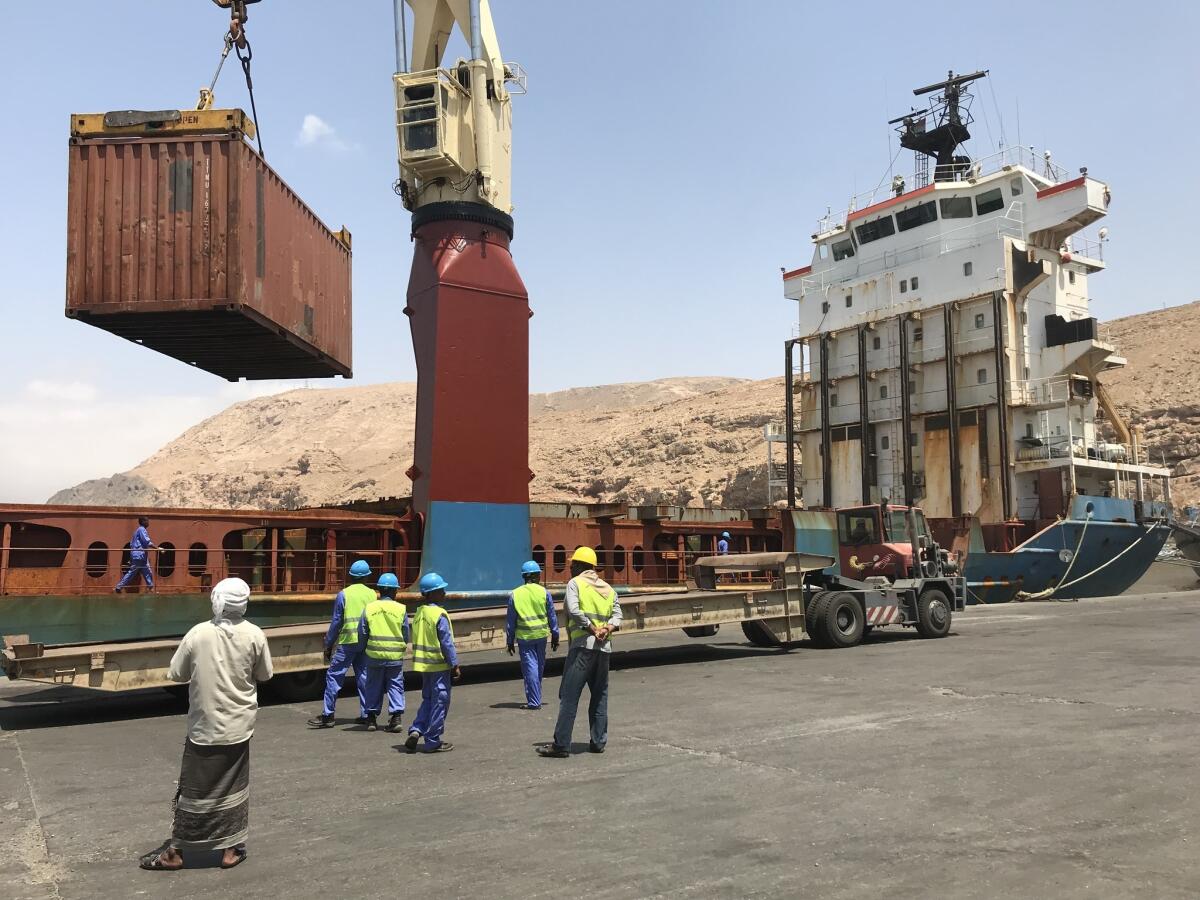
But such extreme violence was rare; Al Qaeda found other ways to win acquiescence from the local population. It seized on long-standing feelings of marginalization by the north, putting some of its ill-gotten gains to work in heavily publicized development projects.
“It said that it was trying to win hearts and minds by being gentle with the population,” said Elisabeth Kendall, a Yemen scholar at the University of Oxford’s Pembroke College who has visited the region.
The militants paved roads and repaired sewer lines, ordered loafing civil servants to put in a full day’s work and paid salaries on time — rare things even before the war. They also promised to defend the predominantly Sunni Muslim population from the Houthis, adherents of the minority Shiite Zaidi sect who are aligned with Saudi Arabia’s archenemy, Iran.
“You want the truth?” asked a father of five, who did not want to be identified for fear of running afoul of the city’s current leaders. “They were good. They imposed order. They imposed efficiency. … Anyone who tells you otherwise is a liar.”
Al Qaeda withdrew in April 2016 in response to airstrikes by the United Arab Emirates, a coalition member, and a ground assault by a Yemeni military force the Emiratis set up — the Hadrami Elite.
In order to spare the city, religious leaders brokered a deal allowing the militants to take their looted cash and weapons with them, according to local sources, though the coalition denies that.
The militants retreated to their traditional strongholds in the province’s interior, a rugged region where they receive protection from local tribes.
Few in Mukalla expect the peace to hold if authorities don’t do more to improve living conditions.
Badr Basalmah, a former Yemeni transport minister who lives in the city, said he is especially worried about soaring unemployment among the biggest segment of the population: young people.
“If we do not take care of these youths, there are other groups of people — Al Qaeda, ISIS, anyone,” he said, using a common acronym for Islamic State. “They are ready to pay money, and they are ready to recruit them. And after that, we will start to fight.”
With some 30,000 members, the Hadrami Elite, which is commanded by the provincial governor, Maj. Gen. Faraj Bahsani, is a major employer. But the force can’t take everyone who needs a job.
“I have the files of 2,000 tribesmen who tried to get into the Hadrami Elite forces and couldn’t,” said Ali Omar Bamazeb, vice president of the Hadramawt tribal confederation.
He also complained about discrepancies in salaries between those paid by the coalition and those paid by local authorities — a situation that could sow discord within the ranks.
Kendall anticipated another problem: “What happens when these people stop getting paid? At some point someone is going to say, ‘Right, the war is over,’ … and you’ll have lots of trained people with guns who can’t find work.”
There are no easy solutions.
Government revenue from the port has proved insufficient, and though the province is rich in oil, the proceeds go mainly to the central government. Bahsani, the governor, recently threatened to block exports of crude if national authorities didn’t offer some relief from rising prices.
Saudi Arabia announced last week that it would provide a $200-million cash infusion to the Yemeni central bank, though there were questions about whether that would be sufficient to halt the fall in the nation’s currency, the rial.
Bahsani said he is pinning his hopes on outsiders. Merchants in the Persian Gulf region, including members of an extensive Hadramawt diaspora, have expressed interest in making investments, he said.
But infrastructure, red tape and corruption are big obstacles.
The regional airport remains closed to commercial traffic because United Arab Emirate troops are using it as a base — and, at least until last year, according to human rights groups, a detention facility where inmates were tortured.
To use the port, importers must get permits from coalition officials in Saudi Arabia, which is concerned about illegal arms shipments destined for the rebels. Then ships can wait for days to unload due to a shortage of berths and demands for bribes, according to local business leaders.
One importer said that even though he had authorization from Saudi Arabia to receive a shipment of food at the port, he was forced to pay $1,000 at the Emirati base to pick it up.
“Why should I pay this?” he said angrily. “It is all back to corruption.”
Emirati officials in Mukalla declined to meet with a group of visiting journalists, including The Times, to answer questions about their activities.
Foreign donors and international aid groups, another potential source of development dollars, remain focused on the dire humanitarian needs in the Arab world’s poorest nation. War has pushed Yemen, a country of 28 million people, to the brink of famine and fueled a deadly cholera epidemic.
The United Arab Emirates is refurbishing hospitals and classrooms in Mukalla and continuing to arm, train and finance the Hadrami Elite, which is credited with maintaining security. But local leaders say that neither the coalition nor humanitarian groups are doing much to spur the economy.
“They forget one very important thing: Humanitarian aid is not covering more than 10% of what the people need,” said Basalmah, the former transport minister. “The majority, 90%, is coming from the economic side — from trading, from business, from job-creating.”
Even if the war is brought to an end, he predicted that Mukalla, along with the rest of Yemen, would remain unstable for years to come.
Twitter: @alexzavis
Zavis visited Mukalla on a trip organized by the Sana Center for Strategic Studies, an independent think tank based in Beirut. Areena Omar Basmael, who provided interpreting, contributed to this report.
Twitter: @alexzavis
Zavis visited Mukalla on a trip organized by the Sana Center for Strategic Studies, an independent think tank based in Beirut. Areena Omar Basmael, who provided interpreting, contributed to this report.
More to Read
Start your day right
Sign up for Essential California for news, features and recommendations from the L.A. Times and beyond in your inbox six days a week.
You may occasionally receive promotional content from the Los Angeles Times.
